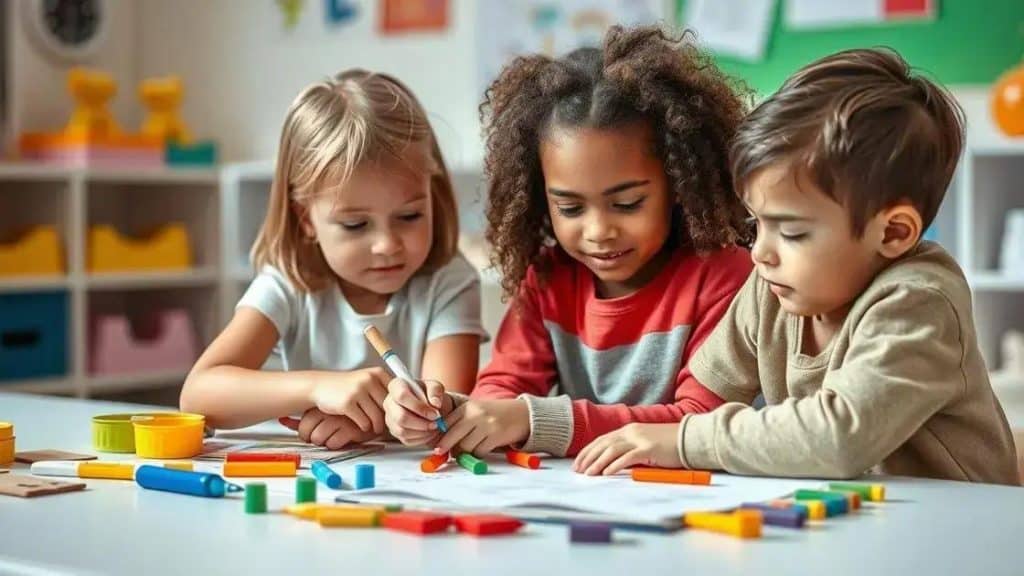Worry early childhood learning: why it matters now

Worry early childhood learning can be addressed by using books, educational apps, positive reinforcement, and engaging activities to create a supportive environment that fosters a love for learning and enhances a child’s development.
Worry early childhood learning is a theme that resonates with many parents. Have you ever considered how your child’s learning environment affects their long-term success? Join me as we delve into this important topic.
Understanding the significance of early childhood learning
Understanding the significance of early childhood learning is crucial for every parent. What does it really mean for your child’s development? This period shapes not just knowledge but also emotional and social skills. It’s a time when children are like sponges, absorbing everything around them.
The Role of Early Learning
Early learning sets the foundation for a child’s future. During these formative years, children develop critical thinking, communication, and even problem-solving skills. Science shows that engaging in educational activities enhances brain development.
Benefits of Early Childhood Learning
- Improves academic performance later in life.
- Enhances social skills and interactions.
- Builds self-confidence and independence.
Moreover, when children are involved in structured learning, they cultivate an enthusiasm for education. It creates a positive association with learning that lasts a lifetime. Social interactions during play and group activities also promote emotional intelligence, teaching children how to manage their feelings.
In addition to emotional growth, children develop essential motor skills through various playful activities. They learn to navigate their environment, build spatial awareness, and improve their coordination. These skills are often developed unconsciously while playing with others, making it a vital aspect of early childhood education.
Parental Influence in Early Learning
Parents play a key role in this process. By engaging with children during their early learning experiences, they encourage curiosity and exploration. Questions like “What do you think happens next?” foster critical thinking.
Effective communication with children is also crucial. When parents discuss the world with their children, they are aiding their understanding of language and concepts. This back-and-forth exchange strengthens bonds and promotes a love for learning, making education a joyful experience.
Common worries parents have about childhood education
Common worries parents have about childhood education often revolve around their child’s development and future success. Every parent wants the best for their child, and it’s natural to have concerns about whether they are providing the right support for learning.
Academic Readiness
One major concern is whether a child is academically ready for school. Parents often question if their child can read, write, or perform basic math before entering kindergarten. They may worry about whether their child’s skills match those of their peers.
Social Skills Development
Another area of concern is social skills. Will their child make friends? Can they share and work well with others? These social interactions are crucial, as they help children build important relationships and develop emotional intelligence.
- Factors affecting social skills include:
- Exposure to group activities.
- Parental guidance in social settings.
- Opportunities for unstructured play.
Parents also wonder about the influence of technology on their child’s learning and interactions. With screens becoming more prominent, many fear that children might miss out on real-life experiences that enhance their social development.
Balancing Education and Play
Finding the right balance between education and play is another frequent worry. Parents recognize that while academic learning is essential, play is also vital for development. They may question how much structured learning is necessary and whether it interferes with playtime.
Additionally, there is concern over how to support learning at home without overwhelming their child. Engaging in activities that reinforce learning at home can help ease this worry. Simple tasks, like reading together and encouraging exploration through games, can make a big difference.
Finally, parents worry about their child’s emotional health during these formative years. Being overwhelmed with expectations or facing difficulties can lead to anxiety. It’s important to maintain open communication and provide emotional support to build resilience and encourage a love for learning.
The impact of early experiences on brain development

The impact of early experiences on brain development is profound and lasting. Research shows that the first few years of a child’s life are critical for shaping brain architecture. During this time, the brain establishes connections that lay the groundwork for future learning and behavior.
Critical Periods of Development
There are specific windows, or critical periods, in which certain skills must be developed. For instance, language acquisition occurs primarily in early childhood. If children do not receive enough stimulation or interaction during this time, it may lead to challenges in communication later.
- The following aspects are crucial for brain growth:
- Consistent emotional support from caregivers.
- Engagement in enriching activities and play.
- Exposure to a variety of experiences and environments.
Moreover, a nurturing environment enables children to explore safely, learn new things, and take risks. Each of these experiences promotes neural connectivity, ensuring a resilient and adaptable brain.
Effects of Neglect and Stress
On the other hand, adverse experiences such as neglect or chronic stress can significantly hinder brain development. High levels of stress can affect how the brain processes information and manages emotions. Children exposed to such conditions may struggle with learning and social interactions.
It’s important to note that the quality of interaction matters. Positive experiences, including loving relationships and engaging activities, lead to healthier brain development. Parents and caregivers can foster an optimal environment by being responsive to a child’s needs.
Activities that stimulate both physical and cognitive skills, such as music, art, and outdoor play, are essential. They help build connections between neurons, which are vital for overall brain health. Therefore, integrating play with educational content can enhance early learning experiences.
Strategies to alleviate concerns about learning
Strategies to alleviate concerns about learning are essential for parents who want to support their children’s education effectively. Many parents worry about their child’s learning pace and overall development. However, by implementing helpful strategies, parents can create a nurturing environment that fosters confidence and curiosity.
Encouraging a Positive Attitude Toward Learning
A positive mindset plays a crucial role in a child’s learning journey. Parents should encourage a love for learning by celebrating small achievements. Recognizing effort can boost a child’s motivation and help them feel proud of their progress.
- Some effective ways to promote a positive learning environment include:
- Reading together every day to build literacy skills.
- Incorporating games that reinforce learning.
- Asking open-ended questions to encourage critical thinking.
Creating a routine helps children understand expectations, which can ease anxiety. By setting aside specific times for homework, reading, or other educational activities, families can establish consistency and security.
Utilizing Resources and Tools
Parents can also utilize various resources to support their child’s learning. Educational apps and websites offer interactive experiences that can make learning enjoyable. Many online platforms provide practice exercises in subjects like math and reading, catering to different learning styles.
Moreover, engaging with teachers and educational professionals can provide valuable insights. Attending school meetings and workshops allows parents to stay informed about their child’s progress and methodologies used in the classroom.
Collaborating with schools to identify additional support can significantly benefit children struggling with specific subjects. This teamwork enhances the educational experience and addresses any concerns.
Resources for supporting early childhood education
Resources for supporting early childhood education are crucial for parents and educators who want to provide the best learning experiences for young children. These resources can help enhance educational activities, support developmental milestones, and create a rich learning environment.
Books and Literature
Reading is fundamental to early education. Parents should invest in a variety of books that cater to different interests and reading levels. Storybooks and picture books with engaging illustrations can capture a child’s attention and promote literacy skills.
- Consider these types of books:
- Interactive and pop-up books.
- Books that include songs or rhymes.
- Non-fiction books that introduce new concepts.
Public libraries are also a fantastic resource. They often hold storytime sessions that encourage a love for reading. Library programs provide children the chance to explore new books and interact with peers.
Educational Apps and Websites
In today’s digital age, there are many educational apps and websites designed to support early childhood education. These resources offer interactive games and activities that make learning enjoyable.
Apps focusing on math, reading, and critical thinking can supplement traditional learning methods. They often adapt to a child’s skill level, providing personalized learning experiences.
Additionally, websites with free printable resources, worksheets, and activity suggestions can be beneficial. Hands-on activities can reinforce concepts learned in school.
Parents should also look for community resources like parenting classes and workshops. These programs provide valuable information on child development and effective parenting strategies.
FAQ – Common Questions About Early Childhood Education
What age is best to start early childhood education?
Early childhood education can begin as young as birth, but significant brain development occurs between ages 0-5, making this period crucial.
How can I support my child’s learning at home?
You can support learning at home by reading together, using educational apps, and engaging in interactive activities that promote curiosity.
What role do parents play in their child’s education?
Parents play a vital role by providing encouragement, creating a positive learning environment, and collaborating with teachers to support their child’s needs.
Are there free resources for early childhood education?
Yes, many public libraries offer free books, storytime sessions, and access to educational materials for parents and children.





